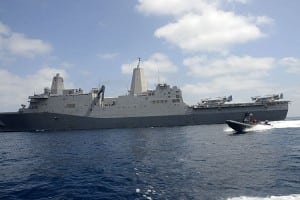Last week Raytheon [RTN] filed a protest with the Government Accountability Office (GAO) against Lockheed Martin [LMT] winning the Navy’s Ship Self-Defense System (SSDS) combat systems engineering contract.
The Navy awarded Lockheed Martin the $56 million contract for the SSDS work last month. The award will make the company the next SSDS Combat System Engineering Agent (CSEA) The SSDS is a combat system that integrates sensors and weapons to defend non-Aegis supported ships like carriers and amphibious ships (Defense Daily, Aug. 15).

The contract includes options that, if exercised, will raise the total value to $638 million and be completed by December 2028.
The GAO protest was issued on Sept. 4. and is due to be decided on Dec. 13.
SSDS is fielded on Gerald R. Ford and Nimitz-class carriers, and amphibious vessels like the San Antonio-class (LPD-17), America-class (LHA-6), Wasp-class (LHD-1), Whidbey Island-class (LSD-41), and Harper’s Ferry-class (LSD-49) ships.
Raytheon is the incumbent engineering agent for SDSS, having served in that role since the program began.
As CSEA, each company develops, integrates, and maintains combat system capabilities for the self-defense system. The latest contract will have Lockheed Martin upgrade the system to the Build 12 version, adding new capability upgrades (Defense Daily, Aug. 19).
Last month, Rich Calabrese, company program director for Surface Navy Mission Systems at Lockheed Martin, told Defense Daily that since the company is the CSEA for the Aegis system, they see this as another step to creating an integrated combat system for both types of ships.
The Navy is looking to eventually create an integrated system using the Common Source Library, itself developed by Lockheed Martin as well.
The company brings “the ability to look across the SSDS and Aegis programs, LCS and frigate and essentially, call it best of breed solutions, that can be brought to bear at what ultimately end up in what they would call the integrated combat system,” Calabrese told Defense Daily (Defense Daily, Aug. 26).
The SSDS CSEA contract had three competitors, but the Navy did not reveal the other two. However, this protest confirms previous incumbent Raytheon as one while in 2014 Northrop Grumman [NOC] won an engineering services contract for SDSS (Defense Daily, July 22, 2014).